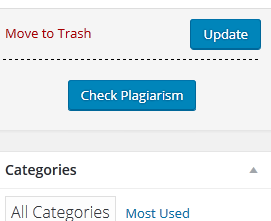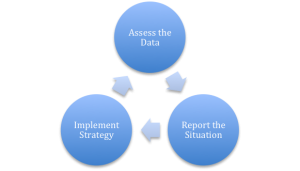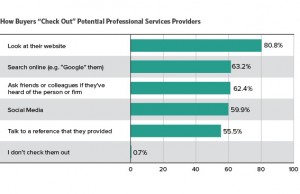Cold calling for sales leads? Blech.
The mere mention of using the phone to “surprise people” brings me back to my early 20s when I was tasked with cold calling local businesses to find buyers or renters. I worked in a luxury high rise building where tenants could buy and/or rent our lavish units.
Something about it felt like an oxymoron; when you’re charging New York prices in Dallas ($ 6,000 a month for rent!), you don’t go begging any unvetted Joe Schmoe to come see “exclusive residences.”
And years later when I started my own business, I resolved to throw cold calling for sales (and emailing, for that matter) out the window.
Here’s why following that mantra has been a boon for B Squared …
Cold Calling For Sales = Spam
The call, or email rather, that took me back to my cold-calling twenties was this message I got today from a real estate sales person.
They sent me the below email about their new co-working space:

Here’s why I view this email (and any non-solicited phone call) as spam:
- I didn’t give this company my email or permission to email me (key word:Non–Solicited)
- I’m not interested in boutique workspace in Manhattan, as I live in NJ and our team is made up of remote workers
- The sender CLEARLY didn’t do his homework and research my location or needs
- There was no personalization or customization — just this blob of a picture telling me workspaces are coming this summer to Madison Ave
The Can-Spam Act, which many people actually think protects them (it doesn’t) from this type of email states the following:
“The backronym CAN-SPAM derives from the bill’s full name: Controlling the Assault of Non-Solicited Pornography And Marketing Act of 2003. It plays on the word “canning” (putting an end to) spam, as in the usual term for unsolicited email of this type; as well as a pun in reference to the canned SPAM food product. The bill was sponsored in Congress by Senators Conrad Burns and Ron Wyden.”
But a closer look reveals:
“The CAN-SPAM Act is occasionally referred to by critics as the “You-Can-Spam” Act because the bill fails to prohibit many types of e-mail spam and preempts some state laws that would otherwise have provided victims with practical means of redress. In particular, it does not require e-mailers to get permission before they send marketing messages.“
And how do we define spam in the digital age?
“Spam or SPAM commonly refers to: Spamming, unsolicited or undesired electronic messages
- Email spam, unsolicited, undesired, or illegal email messages
- Messaging spam, unsolicited, undesired, or illegal messages in general (private messages on websites, sms, messenger etc…)”
Much like SPAM, cold calling for sales is the unsolicited act of calling someone to sell them goods or services.
When something is unexpected, uninvited, or unsolicited the chances of a conversion are slim to none. And, less than 2 percent of cold calls actually result in a meeting being scheduled.
I don’t know about you, but when I have my sales hat on, I like to focus on high-yielding activities rather than pursuits that will cause my potential customer pain, panic, or annoyance.
Rather than marketing to everyone through cold calling or sending cold emails, I like to put an emphasis on what’s warm.
I’ve Never Had To Make A Cold Call — Here’s Why
From the start, I focused on warm leads and introductions.
My first client was my dad’s company. My second client was my then boyfriend’s (now husband’s) company. And my third client was the friend of a friend.
As I focused on more sales-related tasks, I took a page from my non-profit days and used a worksheet called “Sphere of Influence” to map out more warm leads.
Essentially, the worksheet has you look at every part of your life to identify where warm leads may reside. Look at spheres like:
- Family
- Current friends
- High school & college friends
- Community clubs
- Social clubs
- Competitive leagues
- Co-workers
- Neighbors
- Vendors
- Networking groups
There are four other ways I’ve managed to keep my business growing year after year without cold calling for sales:
- Nurturing online relationships to IRL (in real life) relationships. Not only have I met a ton of digital friends IRL (SO COOL), I’ve managed to obtain work from other marketers who have overspill or don’t specialize in “done-for-you” social media management. Nearly 30% of our current business consists of referrals from other marketers (who I first met through social media). Not a bad return on investment if you ask me!
- Growing my list, yes. But more importantly, audience development and segmenting my lists so I can send better/more relevant content to certain groups.
- Join powerful networking groups. This year alone I’ve managed to obtain more than $ 100,000 in new business from my networking groups. I currently belong to two; one in NJ and one in NYC.
- Our friends and cohorts feel comfortable recommending B Squared not only because they know and trust us, but also because we offer referrals for closed leads. Referral Programs can be huge for your business!
Cold Calling: Don’t Do It!
Perhaps I’m not being open enough by embracing this “I’d-rather-die-than-call-someone-out-of-the-blue” attitude. But I have to go with my gut here and I know how irritated I get when these solicitors call or email me out of nowhere.
Do you agree? Is cold calling for sales leads old-school thinking? Or am I too modern for my own good?
What are some of the ways you avoid cold calling for sales? Let us know about them in the comments below!
Business & Finance Articles on Business 2 Community(56)
Report Post






